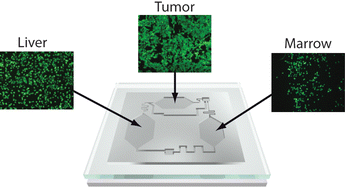A microfluidic device with 3-D hydrogel cell cultures has been developed to test the cytotoxicity of anti-cancer drugs while reproducing multi-organ interactions. In this device, a micro cell culture analog (µCCA), cells embedded in 3-D hydrogels are cultured in separate chambers representing the liver, tumor, and marrow, which are connected by channels mimicking blood flow. While the microfluidic network provides a platform for mimicking the pharmacokinetic and pharmacodynamic profiles of a drug in humans, the 3-D hydrogel provides a more physiologically realistic environment to mimic the tissue than monolayer culture. Colon cancer cells (HCT-116) and hepatoma cells (HepG2/C3A) were encapsulated in Matrigel and cultured in the tumor and the liver chamber in a µCCA, respectively. Myeloblasts (Kasumi-1) were encapsulated in alginate in the marrow chamber; a stiffer hydrogel was necessary to prevent cell migration out of the matrix. The cytotoxic effect of Tegafur, an oral prodrug of 5-fluorouracil (5-FU), on each cell line was tested using the µCCA with cell-embedded hydrogel. The comparison of experimental results using a 96-well microtiter plate and a µCCA demonstrated that the µCCA was able to reproduce the metabolism of Tegafur to 5-FU in the liver and consequent death of cells by 5-FU, while the cultures in a 96-well microtiter plate were unable to do so. The µCCA utilizing 3-D hydrogel cell cultures has potential as a platform for pharmacokinetic-based drug screening in a more physiologically realistic environment.

You have access to this article
 Please wait while we load your content...
Something went wrong. Try again?
Please wait while we load your content...
Something went wrong. Try again?


 Please wait while we load your content...
Please wait while we load your content...